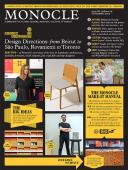
Issue 88
Design Directory: from Beirut to São Paulo, Rovaniemi to Toronto. Part two – of Monocle’s overview of the best in handsome architecture, desirable furniture, retail outposts, fine craft folk and top designers.
In This Issue
Oops! No content was found.
Looks like we no longer have content for the page you're on. Perhaps try a search?
Return Home

